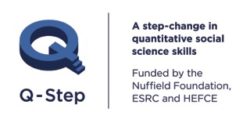Quantile regression: when to use it and how
- Date
- Thursday 17 May 2018
Linear regression models are statistical tools used to uncover the relation between a response variable and set of predictor variables. Standard least-squares linear regression estimates how the mean response varies with the predictors. However, there are cases where the behaviour of the mean response is not the main object of interest. For example, suppose that we are interested in quantifying the relation between alcoholism and alcohol prices. Here, running a least-squares linear regression would show how the average consumption reacts to alcohol prices. However, the reaction of the average drinker to price changes is probably be quite different from that of heavy drinkers, which might be the sub-population of interest for such a study. In this example quantile regression would be more useful, because it models the relation between the predictor variables and a specific quantile of the response variable (possibly quantile 0.95 in this case). Beside providing a more comprehensive view of the effect of the predictors on the response variable, quantile regression has other favourable properties, such as robustness to outliers.
The workshop will be taught by Dr Matteo Fasiolo (University of Bristol).
The data to be used in this workshop will come from linguistics and social sciences.
| 10:00 | presentation: introduction to quantile regression |
| 11:00 | break |
| 11:30 | hands-on session |
| 12:30 | lunch |
| 13:30 | presentation: additive quantile regression |
| 14:30 | break |
| 15:00 | hands-on session |
The event is free, but registration is required for catering purposes.
It is organised by Language@Leeds in collaboration with Q-Step, an initiative to enhance the quantitativelskills of social science graduates. It is funded by the Nuffield Foundation, the Economic and Social Research Council (ESRC) and the Higher Education Funding Council for England (HEFCE).

